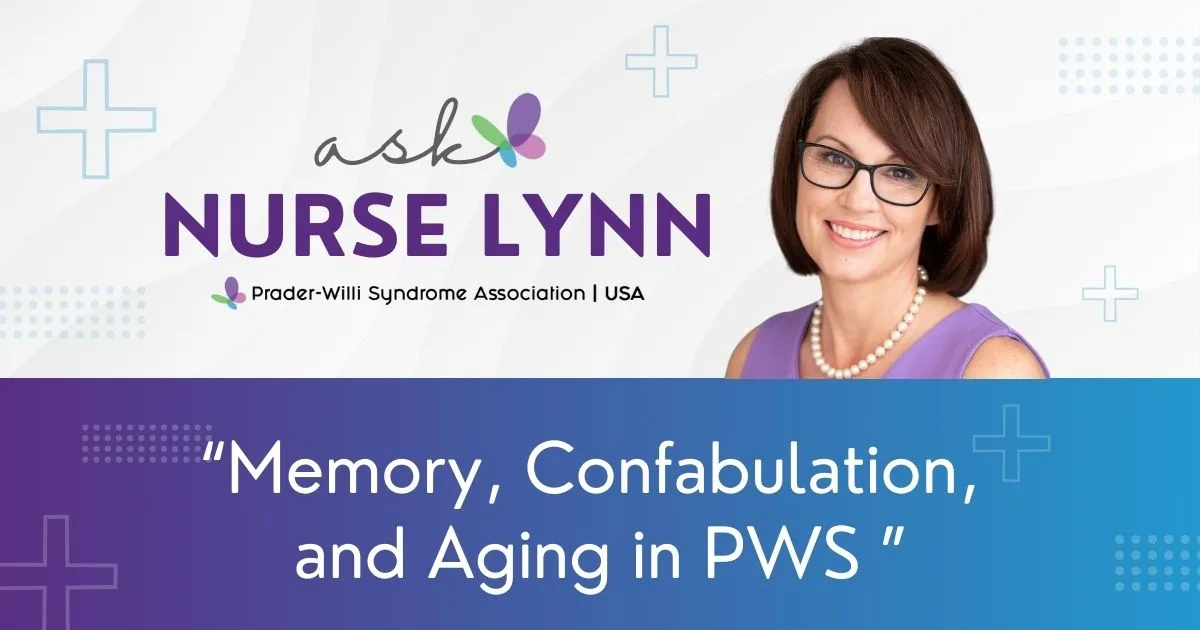Question:
Female, 58 years old, Deletion subtype
My daughter will be 58 on Jan. 14, 2025. I am interested in any information on older PWS persons. She lives in Canada. We have no APWSA anymore. She seems to be having issues with memory, confabulation, and possibly early dementia. Is this normal?
Nurse Lynn’s Response:
Memory issues, confabulation (filling in memory gaps with fabricated or misinterpreted information), and early signs of dementia can occur in adults with PWS. Adults with PWS may experience a variety of cognitive and mental health challenges, though dementia is not a well-documented hallmark of the condition.
Cognitive Challenges in PWS: Individuals with PWS often have varying degrees of intellectual disability or cognitive impairment. Memory difficulties might stem from these challenges rather than dementia. Confabulation could also result from underlying anxiety, compulsive behavior, or difficulty distinguishing memory from imagination—common features in PWS.
Health Conditions That Mimic Dementia: Several medical conditions can contribute to memory problems or cognitive decline in adults with PWS. These include:
- o Sleep Disorders: Untreated sleep apnea or inadequate BiPAP support can cause cognitive fog and memory issues.
- o Thyroid Dysfunction: Hypothyroidism is common in PWS and can affect memory and cognitive function.
- o Nutritional Deficiencies: Low levels of vitamin B12, vitamin D, or other nutrients could lead to cognitive symptoms.
- o Medications: Side effects of certain medications, especially psychotropics, can impair cognition.
Possible Dementia: While rare, early-onset dementia can occur in some individuals with genetic syndromes, including those with underlying neurological or vascular risks.
What to do next:
- Comprehensive Evaluation: It’s important to consult a healthcare provider familiar with PWS. A neuropsychological evaluation and medical workup can help identify the root cause of the symptoms.
- Check for Contributing Factors: Sleep studies, thyroid testing, and medication reviews should be part of the evaluation.
- Specialist Input: If dementia or another neurodegenerative condition is suspected, consultation with a neurologist may be necessary.
- Case Report of Dementia in PWS: A 2010 case study detailed a 58-year-old woman with PWS who developed dementia. This report suggests that dementia might be associated with PWS and emphasizes the need for further clinical studies to determine if premature Alzheimer’s changes or other forms of dementia are more prevalent in individuals with PWS. Dementia in a woman with Prader-Willi syndrome – PubMed
- Increased Brain Age in Adults with PWS: A 2019 study found that adults with PWS exhibited signs of premature aging in the brain, including cortical atrophy. These findings align with observations of cognitive and functional decline in older individuals with PWS, indicating a potential link to neurodegenerative processes. Increased brain age in adults with Prader-Willi syndrome – PMC
- Research on Early-Onset Alzheimer’s Disease in PWS: The Foundation for Prader-Willi Research has initiated studies to assess the risk of early-onset Alzheimer’s disease in people with PWS. Recognizing that life expectancy in PWS is rising due to early diagnosis and interventions, this research aims to determine if there is an increased risk of Alzheimer’s in this population. The risk of early onset Alzheimer’s disease in Prader-Willi syndrome
These studies highlight the importance of monitoring cognitive function in individuals with PWS, especially as they age. While more research is needed to establish a definitive link between PWS and dementia, these findings suggest that cognitive decline may be a concern in older adults with the syndrome.
Resources:
PWS Aging Research and Health Updates – Part 1
PWS Aging Research and Health Updates – Part 2
Do you have a question for Nurse Lynn? Submit your question here:
Share this!





 Perry A. Zirkel has written more than 1,500 publications on various aspects of school law, with an emphasis on legal issues in special education. He writes a regular column for NAESP’s Principal magazine and NASP’s Communiqué newsletter, and he did so previously for Phi Delta Kappan and Teaching Exceptional Children.
Perry A. Zirkel has written more than 1,500 publications on various aspects of school law, with an emphasis on legal issues in special education. He writes a regular column for NAESP’s Principal magazine and NASP’s Communiqué newsletter, and he did so previously for Phi Delta Kappan and Teaching Exceptional Children. Jennifer Bolander has been serving as a Special Education Specialist for PWSA (USA) since October of 2015. She is a graduate of John Carroll University and lives in Ohio with her husband Brad and daughters Kate (17), and Sophia (13) who was born with PWS.
Jennifer Bolander has been serving as a Special Education Specialist for PWSA (USA) since October of 2015. She is a graduate of John Carroll University and lives in Ohio with her husband Brad and daughters Kate (17), and Sophia (13) who was born with PWS. Dr. Amy McTighe is the PWS Program Manager and Inpatient Teacher at the Center for Prader-Willi Syndrome at the Children’s Institute of Pittsburgh. She graduated from Duquesne University receiving her Bachelor’s and Master’s degree in Education with a focus on elementary education, special education, and language arts.
Dr. Amy McTighe is the PWS Program Manager and Inpatient Teacher at the Center for Prader-Willi Syndrome at the Children’s Institute of Pittsburgh. She graduated from Duquesne University receiving her Bachelor’s and Master’s degree in Education with a focus on elementary education, special education, and language arts. Evan has worked with the Prader-Willi Syndrome Association (USA) since 2007 primarily as a Crisis Intervention and Family Support Counselor. Evans works with parents and schools to foster strong collaborative relationships and appropriate educational environments for students with PWS.
Evan has worked with the Prader-Willi Syndrome Association (USA) since 2007 primarily as a Crisis Intervention and Family Support Counselor. Evans works with parents and schools to foster strong collaborative relationships and appropriate educational environments for students with PWS. Staci Zimmerman works for Prader-Willi Syndrome Association of Colorado as an Individualized Education Program (IEP) consultant. Staci collaborates with the PWS multi-disciplinary clinic at the Children’s Hospital in Denver supporting families and school districts around the United States with their child’s Individual Educational Plan.
Staci Zimmerman works for Prader-Willi Syndrome Association of Colorado as an Individualized Education Program (IEP) consultant. Staci collaborates with the PWS multi-disciplinary clinic at the Children’s Hospital in Denver supporting families and school districts around the United States with their child’s Individual Educational Plan. Founded in 2001, SDLC is a non-profit legal services organization dedicated to protecting and advancing the legal rights of people with disabilities throughout the South. It partners with the Southern Poverty Law Center, Protection and Advocacy (P&A) programs, Legal Services Corporations (LSC) and disability organizations on major, systemic disability rights issues involving the Individuals with Disabilities Education Act (IDEA), Americans with Disabilities Act (ADA), and the federal Medicaid Act. Recently in November 2014, Jim retired.
Founded in 2001, SDLC is a non-profit legal services organization dedicated to protecting and advancing the legal rights of people with disabilities throughout the South. It partners with the Southern Poverty Law Center, Protection and Advocacy (P&A) programs, Legal Services Corporations (LSC) and disability organizations on major, systemic disability rights issues involving the Individuals with Disabilities Education Act (IDEA), Americans with Disabilities Act (ADA), and the federal Medicaid Act. Recently in November 2014, Jim retired.